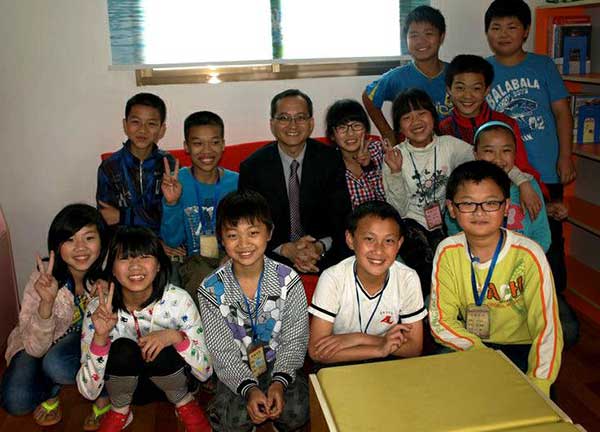Book to the future
 |
|
Leung Wai-ming sits with students from Yintang Village Middle School, Shuangfeng county, Hunan province. The school is one of 300 in the province that have received books donated by the Reading Dream Program, which Leung launched in 2007.[Photo provided to China Daily] |
A former headmaster has spent a decade building libraries to improve the prospects of illiterate children in Hunan province, as Wang Yuke reports from Hong Kong.
The children couldn't read. That was the first thing Leung Waiming, a former headmaster from Hong Kong, noticed when he visited a rural school in Shaoshan, a city in Hunan province, in 2007. What possible future could they expect in the modern technological era? he wondered.
When Leung asked to visit the school library, he was taken to a small room - practically a closet - where books sat on a narrow shelf, covered in dust. He was shocked by the apparent indifference to reading.
Talking to the children, Leung realized they were shy and lacked confidence. He also saw that their futures were not promising, given a learning environment so different from their peers in Hong Kong.
"Can I help the school to make a change? What can I do?" he asked himself. Then he had an idea. He would help build libraries for the rural students.
"I remember when I was in Primary 6," one grateful former student wrote to Leung. "We had our own library and it was the first time I read Snow White and the Seven Dwarfs. I took to it immediately. That was the happiest time of my childhood ... Now I work. I hope someday to travel the globe, like the hero of Around the World in 80 Days!"
Letters like that are deeply gratifying to Leung because they represent the perfect outcome of a decade spent promoting reading and building libraries at rural schools on the mainland.
Ten years ago, he started the Reading Dream Program to provide hope of a better future for more than 200,000 impoverished children.
So far, the program has built more than 300 school libraries and supplied books for students for whom reading would otherwise have been an unattainable luxury.
Now, in schools where libraries have been established, reading is the norm.
"Children living in poverty are prone to low self-esteem. They consider themselves inferior to others," said Leung, adding that reading means knowledge and growing intelligence, and intelligence gives children self-confidence and equips them for future challenges, whether in their studies or in life.
"I want to see them walking tall, with confidence and dignity," he said.
Many students from these rural schools used to perform badly in regional or local academic rankings. Now, some have risen in scholastic achievement and have been admitted to top regional secondary schools. Leung's contribution has not been lost on parents, either. They take pride in the children's achievements, and some even donate money to the program to help it expand.
Leung, now 58 and approaching retirement, has always wanted the program to move faster, and can barely contain his impatience. "The school year is quite short for a child. I'm pressed for time to make them aware of the benefits of reading," he said.
















